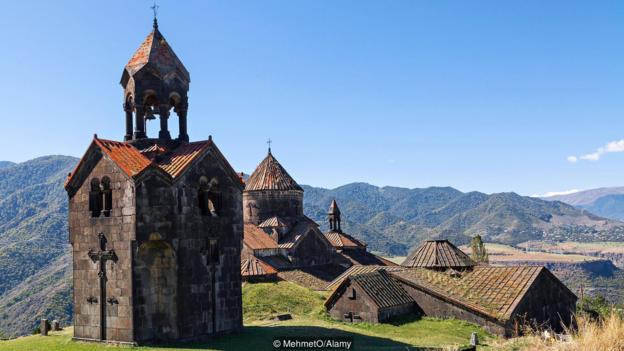BBC publishes article on Armenia and great hospitality of Armenians
This post was originally published on this siteBBC published an article on Armenia entitled ‘Why Armenians love strangers’.
The author of the article Ben Lerwill tells about the visit to Armenia and the great hospitality of Armenians.
Before arriving in Yerevan the author visited Dilijan. “I never meant to spend the night in Dilijan. I’d been making my way through northern Armenia towards the capital city of Yerevan, having crossed from Georgia several days earlier. But the little town was attractive, slung across slopes cloaked in oak woods. I later learned that in Soviet times Dilijan had earned a reputation as an artists’ retreat, and that its picturesque forested location means it gets referred to as ‘Little Switzerland’”, Lerwill writes.
Eventually he finds a guesthouse where he spends the night. At 19:00 the owners of the house called him for dinner. Later it was revealed that the owners of the house were celebrating the 18th birthday of their eldest daughter Lusine.
Ben Lerwill in the article presents the table full of dishes. “There were aubergines and olives, fresh radishes and mounds of stringy cheese. Then came barbequed pork, and greens with garlic. At some point there was a bowl of chopped mushrooms fried with onions, and chicken in an unctuous, spicy sauce. The menu became something of a blur. The reason for this was the oghi, or homemade fruit vodka. Our feast-bearing table was split by gender, with females at one end and males at the other”, he writes.
“As the banquet roared on, the uncles insisted that our end of the table drink to everyone and everything. To Armenia. To the UK. To their families. To my family. To people long dead. To the future. To friendship. Some toasts left me clueless, but all went the same way – the chink of glasses, the tossed elbows, the warm throat-burn of alcohol. Soon there were songs, and cakes. I was dizzy with it all. The evening ended with bear hugs all round, and linguistically doomed attempts to declare everlasting kinship”.
Haghpat Monastery
The next day he decided to pay for his stay in the guesthouse, however, the owners refused to take money from him.
“Only then did the extent of the family’s welcome sink in. I was a complete stranger from a country thousands of miles away. I’d turned up at their gate, unannounced, unshaven and barely an hour before a landmark family dinner, yet I’d not just been granted a bed but been ushered into the festivities as naturally and lavishly as if I’d been one of their own. It stretched the definition of ‘guesthouse’ to improbable extremes”, he said.
He highlights that Armenians have long been renowned for generosity to outsiders. “The country’s location on the historical trade networks of the Silk Road is integral to this. The region has seen the passage of countless thousands of merchants, soldiers, migrants and wayfarers. As long ago as 400BC, the Greek general Xenophon brought his troops this way and gave accounts of tables groaning with lamb, poultry and barley wine”, he writes.
“Armenia has known unspeakable pain and hardship, not least in the form of the deportations and deaths of up to 1.5 million of its people between 1914 and 1923. Dozens of US states and 29 countries have recognized this as an act of genocide by the Ottoman Empire. Today’s Turkish state denies the description. Armenia’s national psyche has, inevitably, been shaped by the period. And in so doing, the notion that those who come in peace should be welcomed with open arms has only been strengthened. I can say this much: when you encounter hospitality in Armenia, you’re unlikely to forget it”, the author concludes the article.
